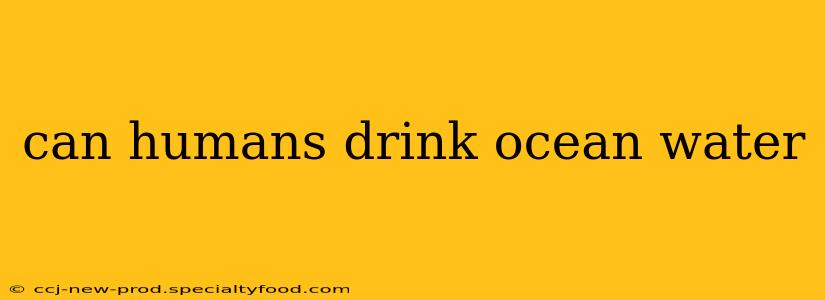Can Humans Drink Ocean Water? A Deep Dive into the Dangers of Seawater Consumption
The short answer is a resounding no. Humans cannot drink ocean water to survive; in fact, doing so can be incredibly dangerous and even fatal. While the idea might seem appealing in a desperate survival situation, the high salt concentration in seawater makes it far more harmful than beneficial. Let's explore why.
Why is Drinking Seawater Dangerous?
The human body is meticulously designed to maintain a delicate balance of fluids and electrolytes. Our kidneys play a crucial role in regulating this balance, filtering waste products and excess salt from our blood. However, our kidneys simply cannot handle the high concentration of salt found in seawater.
Seawater contains roughly 3.5% salt (sodium chloride), a significantly higher concentration than the salt content of our bodily fluids. When we drink seawater, our bodies have to work incredibly hard to excrete the excess salt. This process requires more water than the seawater provides, ultimately leading to dehydration. The kidneys struggle to eliminate the excess salt, and the body can even start to lose more water in an attempt to flush out the salt, exacerbating the dehydration.
What Happens When You Drink Seawater?
Drinking seawater can trigger a dangerous chain reaction:
- Dehydration: The body uses more water to try and excrete the salt than it gains from the seawater itself, leading to severe dehydration. This can cause weakness, dizziness, confusion, and eventually organ failure.
- Electrolyte Imbalance: The high sodium concentration disrupts the delicate balance of electrolytes in the body. This can lead to nausea, vomiting, diarrhea, and potentially fatal cardiac arrhythmias.
- Kidney Damage: The constant strain on the kidneys from processing excess salt can damage them over time.
How Much Seawater is Too Much?
There's no safe amount of seawater consumption. Even small amounts can contribute to dehydration and electrolyte imbalance, especially in individuals already dehydrated or with pre-existing medical conditions.
What About Desalination?
It's important to distinguish between drinking raw seawater and consuming desalinated water. Desalination is a process that removes salt and other impurities from seawater, making it safe for consumption. However, this is a complex technological process and not something achievable in a typical survival situation.
Are there any exceptions?
There are no exceptions. The physiological limitations of the human body regarding salt excretion remain consistent.
Can I use seawater for other purposes?
Seawater has many uses other than drinking. It can be used for cleaning (with caution to avoid corrosion), irrigation in certain controlled environments, and various industrial processes. However, it’s vital to remember to never drink it.
What should I do if I accidentally ingest seawater?
If you accidentally ingest seawater, it's crucial to drink plenty of fresh water to help your kidneys flush out the excess salt. Seek medical attention if you experience any symptoms of dehydration or electrolyte imbalance, such as excessive thirst, weakness, dizziness, or vomiting.
In conclusion, while the ocean is a vast and vital resource, its water is definitively not meant for human consumption. Understanding the dangers of seawater ingestion is crucial for survival and overall health.
